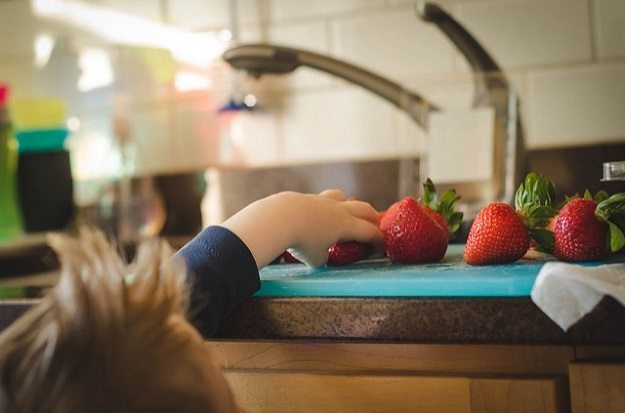Simple Health for Kids and Families

Childhood obesity is a complicated problem. Without a single cause, it is a widespread issue that impedes health for kids. As a Together Counts™ partner, we realize that to help prevent and treat childhood obesity, and create healthful eating habits, it is important to start simple by encouraging the whole family to get involved! Weight loss for kids doesn’t have to be difficult or painful. Simple steps like making breakfast a priority, offering healthy snacks and serving appropriate portion sizes can help your child maintain a healthy body weight.
Break for the Morning Meal
For starters, eat breakfast! It is everyone’s most important meal of the day. Breakfast breaks the overnight fast, hence the name. It provides needed fuel to maintain blood sugar levels, primes muscles for the day’s work and sends the necessary nutrients to all cells of the body for growth. Eating breakfast also helps prevent your child’s hunger as the morning wears on, preventing overeating later in the day.
Research shows that breakfast eaters have higher school attendance, less tardiness and fewer hunger-induced stomachaches in the morning. They have better concentration, can more easily problem solve and have better muscle coordination.
Stick to Home
Another way to maintain a healthy weight for kids is to limit eating out. Did you know that portion sizes at restaurants have increased throughout the years? One study found that all adolescents, especially teens, eat too many calories at quick service restaurants, but overweight adolescents are especially susceptible to overeating while eating out. Although most restaurants have lower-calorie options and healthy choices, most teens still go for the high-calorie options.
Reduce Portion Size
Eating frequently can also help keep hunger at bay. Active children may need to eat two or three snacks in addition to three meals a day. Keeping these frequent meals and snacks at kid-sized portions will keep calories in check.
Research shows that environmental cues, such as large plates and big cups, encourage us to eat and drink more than if plates and cups were smaller, so consider scaling back on plate and cup sizes for everyone in the family.
Finally, snacking, like eating frequency, may not be related to obesity. Kids like to snack, and it can be a good way to increase nutrient intake. Just keep the snacks healthy (fruits, veggies, whole grains, nuts and low-fat dairy foods) and keep portion sizes small. Remember, snacks should not be meal replacements.
David Ettenberg is the founder and director of Camp Shane, with locations in New York, Arizona, California, Georgia, Texas and Wisconsin. He is a certified camp director, as well as a member of the National Camp Association and the New York State Camp Director’s Association. David is a recognized expert on weight loss camps and loved by thousands of parents and campers for his life-changing work for over 48 years.
Check out these articles from Together Counts on ways to better arm your family with healthy habits:

